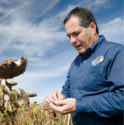Advertise Follow Us
Items Tagged with 'humidity'
ARTICLES
What I've Learned from No-Tilling
5 Factors Help No-Tiller Come Out Ahead
Watching weather conditions at critical growing points, and annual soil testing, has helped Doug Goehring succeed at no-till.
Read More
What I've Learned from No-Tilling
Fixing Flaws Of No-Till In Infancy Led To Opener
To establish consistent seed germination, New Zealand’s John Baker learned that protecting soil humidity when planting was a critical need with no-till opener designs.
Read More







